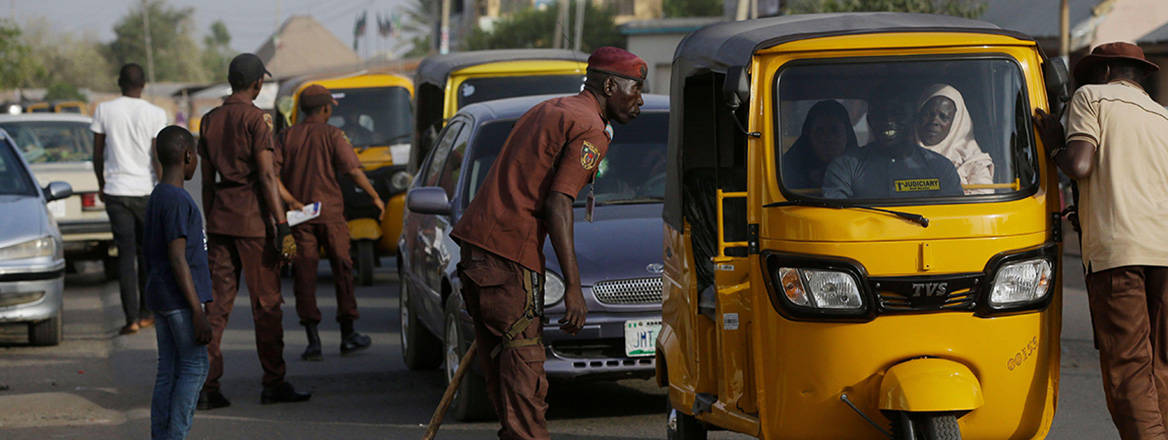‘The Gun is Your Government’: Legitimacy, Authority and Security in Nigeria
The results of Nigeria’s election are still coming in, but the electoral campaign has been plagued with violence as the country is besieged by conflict and insecurity on multiple fronts. Amid this fracturing, the state is struggling to maintain its legitimacy, and new sources of public authority are gaining ground.
Non-state armed groups (NSAGs) are becoming an increasingly important feature of day-to-day life for people across Nigeria. Across the north, vigilante groups have been enabled to tackle widespread banditry and Islamist terrorists in the form of Boko Haram and Islamic State West Africa Province (ISWAP). Elsewhere, separatist violence – related to calls for the establishment of an independent state of Biafra – continues, and the threat of a resurgence of violence in the Niger Delta remains a concern. With the state struggling to maintain control, the military is now deployed on active duty in over 90% of the country.
In the north alone, the conflict has killed thousands, contributed to the deaths of hundreds of thousands more and caused widespread displacement. The state has paid a price for its inability to control the situation. 89% of respondents to a recent poll feel that Nigeria is heading in the wrong direction, and only 34.75% of registered voters participated in the last election in 2019. This hints at a worrying trend: the state is facing not only a problem of security, but also one of legitimacy.
Weberian concepts of legitimacy focus on the relationality of public authority. Legitimacy can be accorded to both state and non-state actors but is generally dependent upon the provision of public goods, which in turn supports a belief within the community in question that claims to authority are legitimate, and thus compliance with said authority is voluntary. In much of Nigeria, the state is no longer fulfilling these requirements, allowing non-state actors to take over.
Provision of Public Goods
With the state unable to guarantee security (a public good in itself), public services in many areas have either collapsed or been withdrawn. Schools have closed to avoid the mass kidnappings plaguing the country, livestock has been stolen and agriculture has been abandoned amid widespread banditry, with massive economic implications. Sections of the economy have also been closed in an attempt to impact NSAGs financially, and healthcare systems are struggling to function. The extent of the violence means that justice systems have failed, with both state and non-state actors enjoying almost total impunity.
It is into this vacuum that NSAGs have stepped. Though still violent, in general, ISWAP has moved away from the tactics of indiscriminate violence and criminality employed by its parent group, Boko Haram. Instead, ISWAP seeks to provide numerous public goods, thereby winning support from communities in the northeast that had experienced decades of abuse and neglect at the hands of both Boko Haram and the state. The group digs wells, provides basic healthcare, guarantees security, polices cattle rustling and its own soldiers, provides seeds and fertiliser to farmers, offers micro-loans to local people, and has supported a revival of agricultural production. By forging strong ties with those under its control, ISWAP has been able to extend its reach, sharing propaganda videos showing the safety and security available under ISWAP rule and encouraging local people to advise their relatives of the opportunities available in ISWAP-held territory.
Local communities are crucial to the legitimisation of non-state actors and the erosion of the state’s authority
Vigilantes, too, by providing a modicum of security to local people, have encroached into a space traditionally occupied by the state. The military has come to depend on groups like the Civilian Joint Task Force (CJTF) to hold territory, gather intelligence, resolve disputes and undertake judicial processes. In the absence of the state, groups like the CJTF have become increasingly relied upon by local communities, even while simultaneously being heavily involved in criminal activities and accused of widespread human rights abuses.
Nigeria’s bandit gangs and groups like Boko Haram do not provide public services, but rely partly on the provision of intangible public goods such as identity, sovereignty and tradition to gain support and new recruits. Boko Haram appealed to a disenfranchised Islamic youth by advocating for sharia law and against state corruption and Western values, promising a better world and a sense of identity to people who felt themselves to have been failed by the state. Similarly, bandit groups exploit the grievances of Fulani herders who feel the state has abandoned them. ISWAP, too, utilises religion to win support in the largely Muslim north.
Voluntary Compliance
The ability to provide public goods and services, guaranteeing a level of security and an environment in which people can go about their daily lives in relative safety, helps instil an ‘interest in obedience’ within local communities. This in turn supports the development of a belief in the legitimacy of a group’s claim to authority and a willingness to comply with said authority.
In turning to NSAGs before the state, local communities are crucial to the legitimisation of non-state actors and the erosion of the state’s authority. Through the provision of public goods, ISWAP has been able to gain legitimacy among local populations, who recognise and follow its rules and regulations and willingly pay the group’s taxes. Such voluntary compliance extends beyond the territories it controls, as people living outside of ISWAP territory have been known to pay taxes to the group and also to return fleeing prisoners. The legitimacy ISWAP has gained locally means that military might alone is unlikely to dislodge it completely.
Similarly, the Nigerian state is likely to struggle to put the genie of vigilantism back in the bottle. Even if current security threats suddenly dissipated, local people are likely to continue to turn to the people and structures that they trust for assistance, granting vigilante groups authority even if the state were to no longer see them as necessary. Given the lucrative nature of criminal activities adopted by vigilante groups as part of Nigeria’s war economy, they may well leverage such legitimacy to further embed themselves at a local level.
Vacuums of Public Authority
Even where NSAGs do not hold territory or provide public goods, state legitimacy has waned. In the absence of any meaningful state presence, large swathes of northern Nigeria are at the mercy of bandit groups, with roads unpassable, crimes unpunished and civilians ruthlessly targeted.
The scale of conflict means that the state is unlikely to be able to ensure the level of security needed to deliver public goods and services
In this legitimacy vacuum, an utter lack of public goods and services fuels resentment, lending credence to the claims of NSAGs rallying against the state. In such an environment, illicit activities are crucial. Those able to exploit the war economy for their own gain are able to prosper, but as a result of such profiteering they have little incentive to lay down their arms, which prolongs the cycle of insecurity.
As a result, citizens are forced to take matters into their own hands, furthering the proliferation of criminality and violence. As one Fulani bandit is quoted as saying, ‘anyone who told you there is government authority is just making empty claims. If you have a gun with which to protect yourself, that is your government’.
No Easy Answers
Opposition parties are already claiming that the results of the election may be illegitimate, due to a lack of transparency in the new electronic voting system. This is just one symptom of a much wider trend of failing state legitimacy. Whatever the final result, the victor will need to marry the current militarised approach to NSAGs with a broader agenda of legitimacy-building both within and outside the political system. In an ideal world, this should include tackling corruption, ending impunity and providing better human rights training for security forces. The provision of public goods – especially healthcare, education and economic opportunity – should also be prioritised.
In reality, however, the scale of conflict means that the state is unlikely to be able to ensure the level of security needed to deliver public goods and services. Without these inroads, the state will struggle to regain the legitimacy it has lost, with more and more citizens left with little choice but to turn to non-state actors for services which the state is increasingly unable to provide.
Read more about RUSI’s work on organised crime and terrorism in Sub-Saharan Africa:
The views expressed in this Commentary are the author’s, and do not represent those of RUSI or any other institution.
Have an idea for a Commentary you’d like to write for us? Send a short pitch to commentaries@rusi.org and we’ll get back to you if it fits into our research interests. Full guidelines for contributors can be found here.
WRITTEN BY
Genevieve Kotarska
RUSI Associate Fellow, OCP | SHOC Network Member - Researcher
- Jim McLeanMedia Relations Manager+44 (0)7917 373 069JimMc@rusi.org



